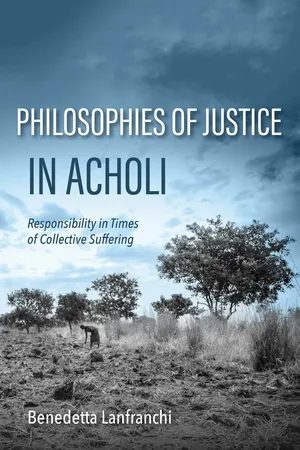
Philosophies of Justice in Acholi
Responsibility in Times of Collective Suffering
- English
- ePUB (mobile friendly)
- Available on iOS & Android
Philosophies of Justice in Acholi
Responsibility in Times of Collective Suffering
About this book
Since 2008 Ugandans residing in the northern region of Acholiland have been faced with the uncertainties of justice stemming from the twenty-year civil war waged between the Ugandan government and Joseph Kony's Lord's Resistance Army (LRA). Seeking accountability and reconciliation within their communities, Acholi and non-Acholi have had to grapple with large-scale practical and philosophical questions: Whose legal system should deliver justice for victims, and what are the aims and responsibilities of justice as a concept?
Philosophies of Justice in Acholi focuses on Acholi traditional mechanisms of justice (ATJMs), which became the central framework for jurisprudence outlined in the peace agreements that were brokered from 2006 to 2008. Framing community members' responsibilities in terms of their ancestral beings has facilitated a justice process that understands the inseparable relations between individuals and groups and thus provides pathways to reclaim social, moral, and material lives. While ATJMs have thus far fallen short of addressing national and global polities' responsibilities in the conflict, their core premises hold promise for defining Uganda's still-developing political justice process and for humans everywhere seeking justice.
Delving into understandings of fairness, responsibility, and group identity, Philosophies of Justice in Acholi reveals that justice, and its effect on collective existence, is always political.
Frequently asked questions
- Essential is ideal for learners and professionals who enjoy exploring a wide range of subjects. Access the Essential Library with 800,000+ trusted titles and best-sellers across business, personal growth, and the humanities. Includes unlimited reading time and Standard Read Aloud voice.
- Complete: Perfect for advanced learners and researchers needing full, unrestricted access. Unlock 1.4M+ books across hundreds of subjects, including academic and specialized titles. The Complete Plan also includes advanced features like Premium Read Aloud and Research Assistant.
Please note we cannot support devices running on iOS 13 and Android 7 or earlier. Learn more about using the app.
Information
Table of contents
- Cover
- Half-Title Page
- Title Page
- Copyright
- Dedication
- Contents
- Acknowledgments
- List of Acronyms
- Introduction
- Chapter 1. Methodological Considerations
- Chapter 2. The Context
- Chapter 3. Community-Based Collective Responsibility
- Chapter 4. The Justice Question
- Conclusion
- Glossary
- Notes
- Bibliography
- Index
- About the Author